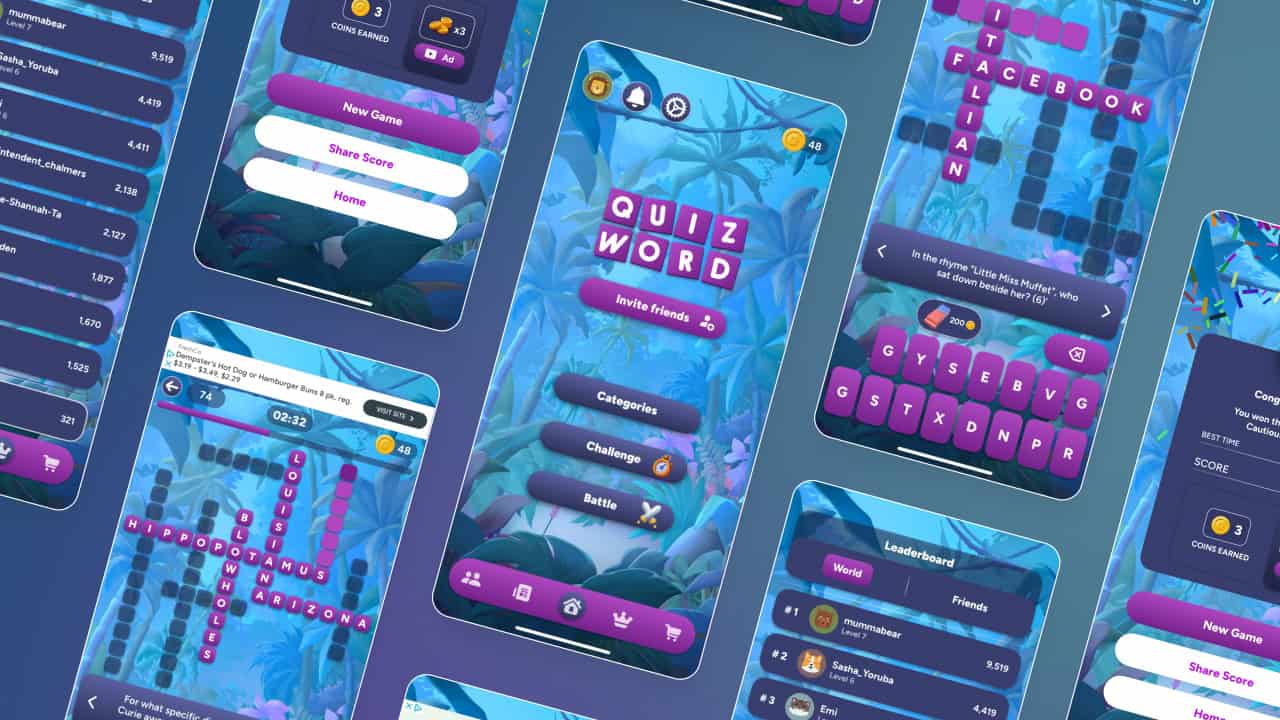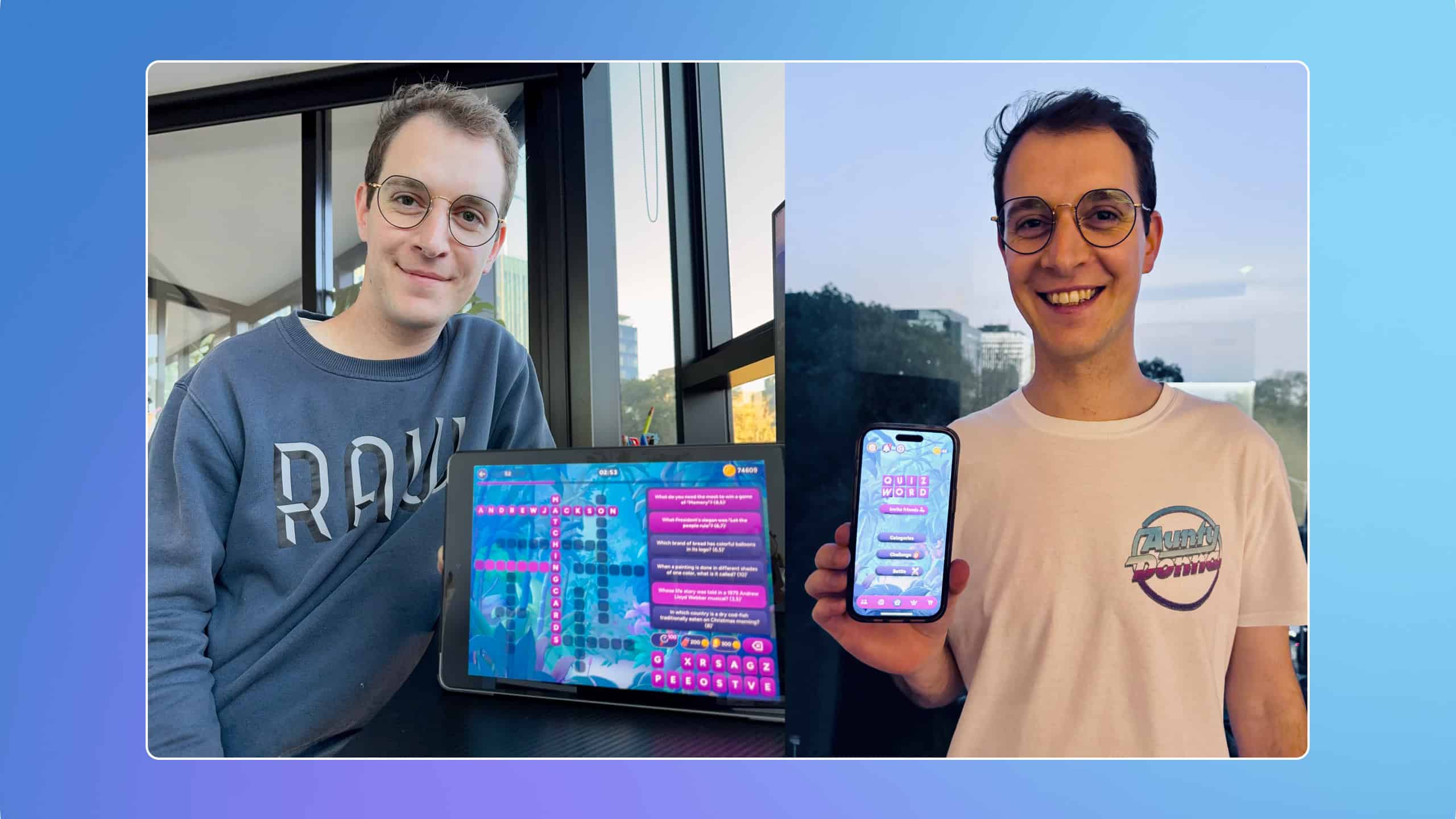Success stories often begin with a simple idea and a passion for learning. Thomas’s remarkable journey from a novice coder to the creator of a highly engaging game “Quiz Word” is no exception. This article will take you through his inspiring path, highlighting the development processes, challenges faced, and the role that CodeWithChris (CWC) played in his success.
A Spark of Inspiration
Thomas’s adventure began in 2015 when he decided to dive into the world of iOS development. With a keen interest in building a game, he set out on a quest to find the best learning resources available. After doing some research, he picked Swift because it’s known for being beginner-friendly. And out of all the courses he looked at, CodeWithChris (CWC) caught his eye with its great reviews and approachable teaching style.
The Initial Steps
Thomas quickly picked up the basics of iOS development when he started with CWC’s UIKit course. He then used his new skills to create Quiz Master, a fun trivia game inspired by the quiz app project from the course. Little did he know, this project would serve as the prototype for what would eventually become Quiz Word.

Journey with Quiz Master
Quiz Master launched in 2017 without proper market analysis and flopped.
Learning from this, Thomas researched the mobile games industry, enlisted Appster for marketing and branding, and pivoted to a successful multiplayer crossword game, Quiz Word. He secured funding through LinkedIn and launched Quiz Word on News Corp’s Kids News site, gaining traction in Australian schools. However, COVID-19 halted expansion plans, leaving Thomas with a great product but limited revenue and no clear path forward.
So, Thomas went back to the drawing board and decided to refresh his iOS Development skills. By then, he discovered that technology had moved forward with the introduction of SwiftUI (for context: SwiftUI was released in 2019).

A comparison video by CWC convinced him to give this new framework a try, despite some initial worries about its reliability for production apps.
“Admittedly during development I was worried it wouldn’t be ok to use in a production app, let alone a game. SwiftUI seemed to get a bad rep early on for elements that didn’t work properly (and they didn’t),” Thomas said. “Luckily by the time I finished the beta, everything was working as expected.”
Building Quiz Word
Switching to SwiftUI presented a challenge for Thomas but also offered a valuable opportunity. He meticulously crafted elements like page navigation and alerts to ensure a seamless user experience that would align with future Android plans. His dedication paid off with the launch of Quiz Word, a crossword game featuring both single-player and multiplayer modes.

In single-player mode, users can choose from a variety of categories and solve crossword puzzles at their own pace. In multiplayer mode, they can engage in live one-on-one matches with friends or random opponents.
Thomas’s dedication to Quiz Word did not stop at just delivering a seamless user experience. He understood that maintaining and evolving the game was essential for its long-term success and player satisfaction.
In fact, he’s already continuing his work on Quiz Word and will likely build an Android version sometime soon. “I’m focusing a little more on obtaining funding to market Quiz Word right now. I would actually love to start freelancing or start my own development studio to build apps or games for clients,” Thomas says.
This forward-thinking approach shows just how dedicated he is, not only to improving Quiz Word but also to exploring bigger opportunities in the development world. By securing the necessary funding, Thomas aims to expand the game’s reach and ensure more trivia fans on different platforms can enjoy the experience he created. Plus, his dreams of freelancing or starting a development studio highlight his passion for coding and his eagerness to create cool solutions for a variety of clients.
The Role of CodeWithChris
Thomas credits much of his success to the structured and easy-to-follow lessons from CodeWithChris. The course provided him with all the necessary information without overwhelming him, making it an ideal choice for a beginner like him. This empowering experience laid a strong foundation for his development skills and fueled his determination to see Quiz Word come to life.

“CodeWithChris surprised me with how easy it is to follow along with the lessons, giving all the information needed without being overwhelming.”
Thomas adds that although he started the course with the intention of building a game, he didn’t expect it to lead into a job. “I had roughly 50% of Quiz Word completed when I applied for dev jobs, and I used it as part of my resume. The company I got employed by was impressed by the design and tab bar animations. It pays to have a little design skill too!”
Thomas’s pieces of advice
Thomas has some valuable advice for aspiring app developers who might not have a lot of experience. He suggests starting with the courses offered by CodeWithChris (CWC), noting how effective they are at breaking down complex topics into manageable lessons. “Check out the CWC courses,” Thomas recommends, “SwiftUI would be my pick to start with.”

For those aiming to land a job in iOS development, Thomas also emphasizes the importance of learning UIKit. “If you’re looking to get a job in iOS development, learn UIKit too. It’s still relevant and widely used,” he advises.
Indeed, while SwiftUI is gaining popularity, UIKit remains a core component in many existing iOS applications and is still preferred by many development teams. By mastering both SwiftUI and UIKit, aspiring developers can significantly boost their skills and increase their job prospects in the competitive field of app development.
Thomas gets it—learning iOS app development can be tough, especially during those moments when you feel like giving up. He shares a personal strategy that kept him motivated: “I started the CWC courses intending to build a game, and that’s what kept me going. Personally, I find programming fascinating and I love working with the iOS ecosystem. If you have the right motivations, you’ll reach that point where everything starts to make sense and it becomes second nature.”
By picking a project that genuinely excites you and aligning it with your learning goals, you can cultivate the enthusiasm needed to overcome obstacles and persist through any learning curves.
Conclusion
Thomas’s story is a testament to the power of perseverance, continuous learning, and the right guidance. From navigating the challenges of learning to code to successfully launching a mobile game, his journey offers invaluable insights for aspiring developers. If you’re inspired by Thomas’s story and want to start your own success story, sign up for CodeWithChris today and turn your ideas into reality!




